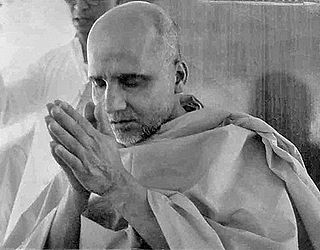
Swami Dayananda Saraswati was a renunciate monk of the Hindu Saraswati order of sannyasa. He was also known as Pujya Swamiji and was a traditional teacher of Advaita Vedanta. He was the founder of the Arsha Vidya Gurukulams in Pennsylvania, USA; Rishikesh, Uttarakhand and Coimbatore Tamil Nadu, India. He was also the spiritual Guru of Prime Minister Narendra Modi. He was awarded the Padma Bhushan,, for his service to the nation in the field of spirituality in 2016.

Swami Chinmayananda Saraswati ,also known as Pujya Gurudev Swami Chinmayananda Saraswati, born Balakrishna Menon; 8 May 1916 – 3 August 1993, was a Hindu spiritual leader and a teacher. In 1951, he founded Chinmaya Mission, a worldwide nonprofit organisation, in order to spread the knowledge of Advaita Vedanta, the Bhagavad Gita, the Upanishads, and other ancient Hindu scriptures. Through the Mission, Chinmayananda spearheaded a global Hindu spiritual and cultural renaissance that popularised these spiritual texts and values, teaching them in English all across India and abroad.
Tapovan Maharaj (1889–1957) was a Hindu sage and Vedanta scholar.

Swami Sivananda Saraswati, also called Swami Sivananda, was a yoga guru, a Hindu spiritual teacher, and a proponent of Vedanta. Sivananda was born in Pattamadai, in the Tirunelveli district of modern Tamil Nadu, and was named Kuppuswami. He studied medicine and served in British Malaya as a physician for several years before taking up monasticism.

Satyananda Saraswati, was a Sanyasi, yoga teacher and guru in both his native India and the West. He was a student of Sivananda Saraswati, the founder of the Divine Life Society, and founded the Bihar School of Yoga in 1964. He wrote over 80 books, including the popular 1969 manual Asana Pranayama Mudra Bandha.

Bochasanwasi Akshar Purushottam Swaminarayan Sanstha is a Hindu denomination within the Swaminarayan Sampradaya. It was formed in 1905 by Shastri Yagnapurushdas following his conviction that Swaminarayan remained present on earth through a lineage of gurus starting with Gunatitanand Swami. As of August 2016, Mahant Swami Maharaj is the 6th guru and president of BAPS.

The Divine Life Society (DLS) is a Hindu spiritual organization and an ashram, founded by Swami Sivananda Saraswati in 1936, at Muni Ki Reti, Rishikesh, India. Today Divine Life Society has branches around the world, with the headquarters situated in Rishikesh. Many disciples of Swami Sivananda have started independent organizations in Mauritius, the United States, Australia, Canada, Malaysia, South Africa, South America, and Europe.

Swami Tejomayananda Saraswati, also known as PujyaGuruji and born Sudhakar Kaitwade, is an Indian spiritual leader. He was head of Chinmaya Mission from 1994 to 2017, until he was succeeded by Swami Swaroopananda in 2017.

Chinmaya Vidyalayas are a group of schools operated by the Central Chinmaya Mission Trust (CCMT), founded by Swami Chinmayananda and currently headed by Swami Tejomayananda.There are more than 80 Chinmaya Vidyalayas across 12 states in India and one in Trinidad. They emphasise the learning of scriptures.

Vishnudevananda Saraswati was an Indian yoga guru known for his teaching of asanas, a disciple of Sivananda Saraswati, and founder of the International Sivananda Yoga Vedanta Centres and Ashrams (ISYVC). He established the Sivananda Yoga Teachers' Training Course, possibly the first yoga teacher training programs in the West. His books The Complete Illustrated Book of Yoga (1960) and Meditation and Mantras (1978) established him as an authority on Hatha and Raja yoga. Vishnudevananda was a peace activist who rode in several "peace flights" over places of conflict, including the Berlin Wall prior to German reunification.

Pranavānanda Saraswati known previously as N. Ponniah was a founding member of the Divine Life Society in Malaysia.

Swami Krishnananda Saraswati (IAST: Swāmī Kṛṣṇānanda Sarasvatī, 25 April 1922 – 23 November 2001) was a disciple of Sivananda Saraswati and served as the General Secretary of the Divine Life Society in Rishikesh, India from 1958 until 2001. Author of more than 40 texts, and lecturing extensively, on yoga, dharma, and metaphysics, Krishnananda was a prolific theologian, saint, yogi and philosopher.

Chinmaya International Residential School is a private school located in Siruvani, Coimbatore, India, in the foothills of the Western Ghats, and encompasses a 100-acre campus.
Swami Prakashananda is the founder and Acharya of Chinmaya Mission of Trinidad and Tobago.

The Gītā Dhyānam, also called the Gītā Dhyāna or the Dhyāna Ślokas associated with the Gītā, is a 9-verse Sanskrit poem that has often been attached to the Bhagavad Gita, one of the most important scriptures of Hinduism. In English, its title can be translated literally as "meditation on the Gita," and it is also sometimes called the Invocation to the Gita.

The Advaita Guru-Paramparā is the traditional lineage (parampara) of divine, Vedic and historical teachers of Advaita Vedanta. It begins with the Daiva-paramparā, the gods; followed by the Ṛṣi-paramparā, the Vedic seers; and then the Mānava-paramparā, with the historical teachers Gaudapada and Adi Shankara, and four of Shankara's pupils. Of the five contemporary acharyas, the heads of the five Advaita mathas, four acharyas trace their lineage to those four pupils and one to Adi Shankara himself.
Uparati is the ability to achieve "dispassion" and is a personal quality considered important in Advaita Vedanta in the pursuit of moksha. Uparati is a Sanskrit word literally meaning "cessation, quietism, stopping worldly action" and "discontinuation of religious ceremonies". According to the Vedic scholar Adi Shankara, Uparati or Uparama is the strict observance of one's own Dharma.

Premanand Govind Sharan, known to his followers as Premanand, is an Indian Hindu guru. He belongs to the Radhavallabh Sect.


















